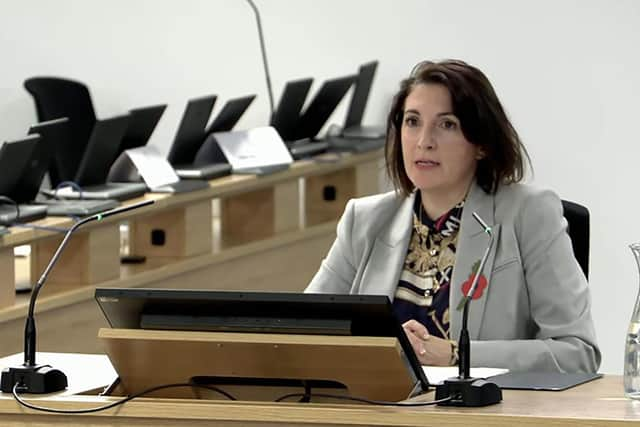Matt Hancock misled colleagues over pandemic preparation, inquiry told
Giving evidence to the official inquiry yesterday, Helen MacNamara, who served as deputy cabinet secretary, said that the then-health secretary suggested in meetings that something was under control before days or weeks later officials would discover “that was not in fact the case”.
She said that it was “very unusual” that there was a “pattern of being reassured that something was absolutely fine and then discovering it was very, very far from fine”, she said.
Advertisement
Hide AdAdvertisement
Hide AdMs MacNamara wrote in her statement that she tried to reassure him that he did not need to be in the office, especially not in No 10, and said it must be “very hard” to be health secretary.


But, she said, he told her he was “loving” the responsibility and to demonstrate this, took up a “batsman’s stance outside the Cabinet room”.
He then said “they bowl them at me, I knock them away”, according to Ms MacNamara.
A spokesman for the former health secretary said: “Mr Hancock has supported the inquiry throughout and will respond to all questions when he gives his evidence.
Advertisement
Hide AdAdvertisement
Hide AdIn her evidence in the inquiry, Ms MacNamara said that Boris Johnson had let the country down in not tackling the “toxic” culture in Downing Street, including the language of his chief advisor Dominic Cummings.
Speaking of expletive-laden messages from Mr Cummings regarding her performance in her role in the Cabinet Office, Ms MacNamara said that she was disappointed in the “violent and misogynistic language” she was the subject of.
When discussing the culture in Downing Street, she added that Coronavirus rules were broken on a daily basis with hundreds of civil servants and ministers potentially at the risk of being fined.
However, despite a session lasting several hours, inquiry lawyers only briefly touched on her own contribution to the culture in No 10, after receiving a fixed penalty notice for her own attendance of lockdown parties.
Advertisement
Hide AdAdvertisement
Hide AdIt had previously been reported that Ms MacNamara, who was at the time the government’s ethics chief, brought a karaoke machine to one party that saw drunken staff vomiting and fighting in government buildings.
It comes as new research suggests that lockdowns and other restrictions brought in during the pandemic had a “real lasting impact” on the brain health of people over the age of 50.
A study found cognitive function and working memory in older people declined more rapidly during the pandemic, regardless of whether or not they were infected with Covid-19.
Researchers said this could be down to factors exacerbated by the pandemic, such as not exercising enough and drinking too much alcohol, as well as loneliness and depression.
Advertisement
Hide AdAdvertisement
Hide AdAnne Corbett, professor of dementia research and Protect Study lead at the University of Exeter, said: “Our findings suggest that lockdowns and other restrictions we experienced during the pandemic have had a real lasting impact on brain health in people aged 50 or over, even after the lockdowns ended.
“This raises the important question of whether people are at a potentially higher risk of cognitive decline which can lead to dementia.”
She added that it is “now more important than ever” to make sure people showing signs of early cognitive decline are supported.